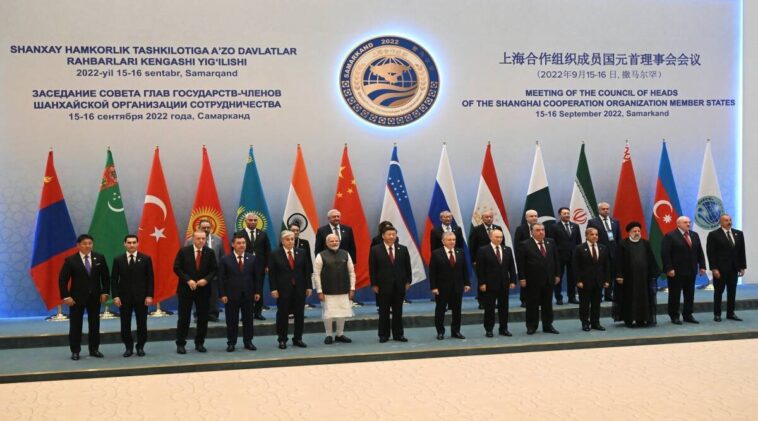The Shanghai Cooperation Organisation (SCO) on Tuesday pledges to prevent the spread of terrorism and to combat terror financing, while India refrained from endorsing China’s Belt and Road Initiative (BRI) alongside the other members of the organization.
The New Delhi Declaration issued at the conclusion of the virtual SCO Summit hosted by India detailed the measures the member states will take to combat terrorism, separatism, and extremism, including “active measures to eliminate the conditions conducive to the spread of terrorism”, disruption of terror financing channels, and suppression of recruitment activities and cross-border movement of terrorists.
The SCO members will eliminate “sleeper cells” and safe havens for terrorists, as well as combat the radicalisation of youth and dissemination of terrorist ideology, according to a joint declaration issued hours after Prime Minister Narendra Modi stated in his opening remarks at the summit that the organization should not be afraid to criticize nations that use terrorism as a tool of statecraft.
India did not reaffirm support for BRI, China’s signature connectivity initiative, like Kazakhstan, Kyrgyzstan, Pakistan, Russia, Tajikistan, and Uzbekistan. In a joint declaration, these nations affirmed their support for ongoing efforts to cooperatively implement the project, including efforts to link BRI with the establishment of the Eurasian Economic Union.
India is one of the few countries that did not sign up for the Belt and Road Initiative (BRI), and it has consistently opposed the initiative due to the fact that CPEC passes through Pakistan-occupied Kashmir. BRI initiatives have imposed a debt burden on countries in the region, according to Indian officials.
The SCO members noted in their joint statement the “inadmissibility of interference in the internal affairs of states under the guise of countering terrorism and extremism” and the “inacceptability of using terrorist, extremist, and radical groups for mercenary purposes.”
The member states emphasized the need for coordinated international efforts to counter terrorist, separatist, and extremist organizations’ attempts to recruit youths. In addition to combating terrorist and extremist groups, the international community should prevent the spread of religious intolerance, aggressive nationalism, ethnic and racial discrimination, xenophobia, fascism, and chauvinism, according to the declaration.
The member states described the early settlement of the situation in Afghanistan as one of the most important factors for bolstering stability in the SCO region and stated that Afghanistan should be rebuilt as a “independent, neutral, united, democratic and peaceful state, free from terrorism, war, and drugs”.
The declaration called for the establishment of an inclusive government in Afghanistan with the participation of all ethnic, religious, and political groups, as well as the facilitation of the dignified and sustainable return of Afghan refugees to their homeland.
As Iran became the newest member of the Shanghai Cooperation Organization (SCO) on Tuesday, member states emphasized the importance of sustaining the Joint Comprehensive Action Plan for the Iranian nuclear program. In accordance with UN Security Council Resolution 2231, all participants must “strictly fulfill their obligations for comprehensive and effective implementation of the document”, according to the declaration.
In the context of economic cooperation, the joint declaration stated that the SCO was “in favor of implementing the roadmap for gradual increase in the proportion of national currencies in mutual settlements by interested member states.”
To promote more equitable and effective international cooperation in the face of a widening technological and digital divide, turbulence in global financial markets, instability of supply chains, obstacles to international trade, and the effects of climate change and the Covivirus-19 pandemic, new approaches are required. All of these factors have contributed to the volatility and unpredictability of the global economy and created new obstacles for economic growth and assuring food and energy security, according to the declaration.
The SCO Summit, attended by the leaders of China, India, Kazakhstan, Kyrgyzstan, Russia, Pakistan, Tajikistan, and Uzbekistan, also adopted two joint statements proposed by India regarding countering radicalisation and cooperation in digital transformation.
According to the joint statement on countering radicalisation, SCO members will strengthen their cooperation to combat radicalisation that leads to terrorism, separatism, and extremism. This will include the exchange of best practices and lessons learned in accordance with the SCO Charter and international law.
The member states will implement programmes to rehabilitate and reintegrate radicalized individuals back into society, thereby preventing their return to terrorist activity. In addition, they will share practical knowledge to ensure the safety of significant international events hosted by member states.
In their second joint statement, members of the Shanghai Cooperation Organization (SCO) acknowledged the role of digital transformation in attaining inclusive and sustainable growth and the Sustainable Development Goals (SDGs). Member states will support the integration of digital solutions in priority areas, including the financial sector and the implementation of digital payments.
Also read this:Sudha Mahindra passes away months after industrialist husband Keshub Mahindra’s death
In order to assess the social and economic requirements of people, the introduction of digital technologies and the rising number of internet users are generating vast amounts of data that require “robust protection and analysis,” according to the joint statement. In addition, a development strategy founded on the analysis of digital data can address a vast array of issues in economics, health, and education.




